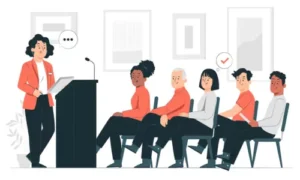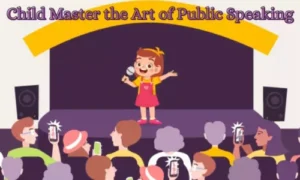Many children find public speaking intimidating; even adults become apprehensive when standing in front of an audience! However, one of the most valuable things you can give your child is the ability to communicate confidently. It boosts their self-esteem, enhances communication skills, and prepares kids for success in school and life.
Let’s explore how you can gently guide your child to master the art of public speaking
1. Start with Everyday Conversations

Confidence starts at home! Encourage your youngster to express their opinions and ideas freely. Ask them simple questions, such as:
- “What was your favourite part of the day?”
- “If you could change something at school, what would it be?”
When children feel heard, they learn to express themselves clearly, which is the first step toward becoming effective communicators.
2. Make Speaking Fun

Public speaking does not have to involve standing on a stage. Make it into a fun game!
- Have family story nights in which everyone tells a brief story.
- Ask your child to introduce family members during gatherings.
- Pretend you’re a news reporter and report on a fun topic like “today’s weather in our living room!”
The more relaxed the atmosphere, the more assured they will be.
3. Teach the Power of Body Language

Good presenters employ not only words, but also their eyes, hands, and posture.
Teach your children to:
- Stand tall and smile.
- Make soft eye contact.
- Make little hand movements while speaking.
You can even videotape them (with their consent) so they may observe and develop — children enjoy seeing themselves perform!
4. Encourage Practice—But Keep It Light

Public speaking, like any other ability, may be improved with practice.
- Begin with brief chats, such as a one-minute speech about their favourite toy or pet.
- Gradually increase the duration and complexity as they gain confidence.
Remember to never put them under strain. Celebrate every single step, even if it is as simple as saying a few words in front of others.
5. Celebrate Effort, not Just Perfection

It’s acceptable if your child forgets a line or feels shy! Praise their efforts:
- “I loved how brave you were to stand up and speak!”
Positive reinforcement helps build confidence. Your encouragement is more important than flawless delivery.
6. Allow Them to See Motivational Speakers

Show your child online school tournaments or kid-friendly speeches. It might be encouraging to watch other kids talk with assurance. Sharing your own experiences of overcoming anxiety can also help them feel understood and supported.
Conclusion
Children may initially find public speaking to be somewhat difficult, but with the correct help and encouragement, it can be an exciting way for them to express themselves. Your tolerance, encouragement, and positivity as a parent can make a huge difference. Your child develops into a confident and articulate speaker with each little step, whether it’s a presentation in class, a narrative at home, or an answer in class.
FAQs
1. At what age should children start learning public speaking?
Children can start as early as 5 or 6 years old. Begin with fun storytelling and small speaking activities to build comfort and confidence gradually.
2. How can I help my shy child speak in public?
Start small — let them speak in front of family or friends. Avoid pushing them too hard; instead, praise every effort and make speaking a fun, stress-free experience.
3. Why is public speaking important for kids?
Public speaking helps children build confidence, improve communication, and think clearly. These skills benefit them in academics, social life, and future careers.






